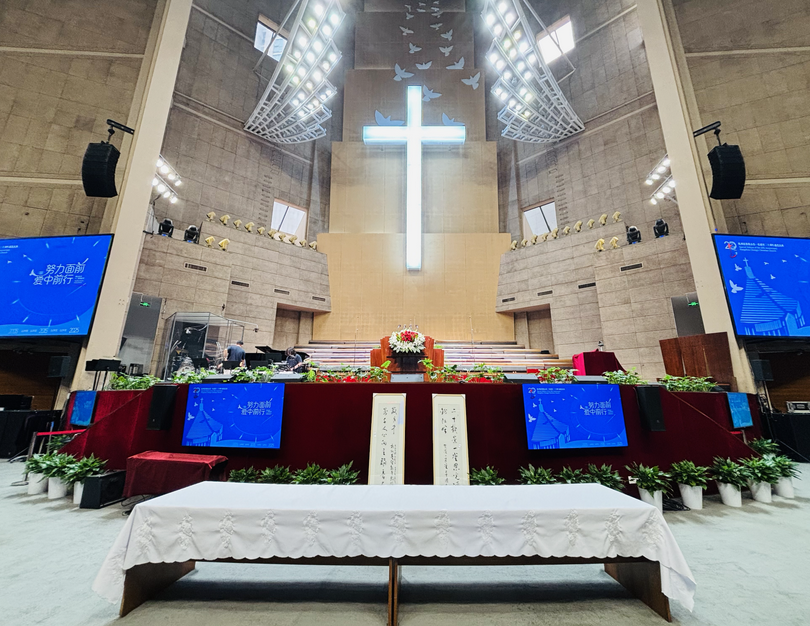"Christians should spend at least an hour each day doing devotions," "You must tithe," "You cannot marry an unbeliever," or "You should never get divorced, no matter what." Such statements may be frequently heard in churches, and the line between expressing loving truth and engaging in moral coercion can be easily blurred.
"When such expectations are absolutized and turned into rigid rules, they can cross the line of biblical truth and become a form of man-made moral coercion," Pastor Ming said in a recent Sunday service at Chongyi Church in Hangzhou, Zhejiang Province.
He explained that the constraints of truth stem from God's love, which frees believers from sin and legalism and leads us into genuine freedom. Through truth, God helps people recognize the nature of sin, and, in doing so, sets them free to live lives aligned with His will. Ming pointed out that human strength cannot free people from the weight of legalism; only through Jesus Christ and the truth of Scripture can they experience genuine liberation.
He noted that truth does not bind people through external force but works through internal conviction and the guidance of the Holy Spirit. "When we sincerely embrace the truth, we naturally long to live by it," he said. "This longing is born out of our love and reverence for God."
Moral coercion, on the other hand, operates differently. Ming pointed to the Pharisees as an example of those who impose such coercion on people. They demonstrate a self-righteousness that manifests in three ways: comparative, critical, and superficial.
"They impose their standards on others and demand that others live according to their model," Ming said. "But Jesus said, 'They tie up heavy loads and put them on men's shoulders, but they themselves are not willing to lift a finger to move them' (Matthew 23:4)."
Such demands are not rooted in love but in control. "The signs of control include using the law to measure someone's spirituality and using external behavior to assess one's spiritual status," Ming said. "For example, saying someone is 'truly spiritual' because they donated ten million. Well, then what about the poor? Are they not spiritual simply because they have no money? When we replace truth with traditional rules, we often fall into a pattern of control."
He pointed out that the behavior of the Pharisees not only added burdens to others but also blocked their capacity for compassion. "They couldn't empathize with the weaknesses of others," he said. "Their self-righteousness was a form of hypocrisy, and imposing moral standards on others often leads to further hypocrisy. People end up pretending to live out certain behaviors without the substance of genuine faith."
Ming contrasted this with Jesus' encounter with the Samaritan woman, noting that Jesus knew everything about her, yet he didn't begin with condemnation or rebuke. Instead, he guided her gently. "Jesus' forgiveness came first, and the woman's repentance followed."
Moral coercion can cause real harm. "Those under moral coercion often find it difficult to build relationships with those who judge them," Ming said. "It suppresses individual freedom and can distort the true meaning of morality."
"Today, many people view morality as a form of external bondage. That's why some turn to cynicism or even reject morality altogether—because they misunderstand what morality truly is," Ming said.
He noted that even within the church, there are instances where faith is used to justify taking advantage of others, such as borrowing money without repaying it, or avoiding paying a dowry because "we're all Christians." He cited Christian business owners who have expressed frustration: "We'd rather do business with non-believers than with fellow believers."
"Truth's constraint does not deprive people of freedom but helps them better enjoy it," Ming said. "Moral coercion, by contrast, infringes on others' freedom."
He also emphasized the need to balance truth and grace, saying that truth awakens, and grace leads people back. "The constraints of truth are like armor made of love," he said. "Truth must be wrapped in love."
Ming encouraged believers to "speak the truth in love," quoting Ephesians 4:15. He urged the congregation to choose the right time, use a gentle tone, and aim to build others up when speaking the truth. At the same time, he emphasized the importance of respecting others' choices.
"When we measure truth with love and practice love with humility, we can avoid falling into the trap of moral coercion," he concluded.












